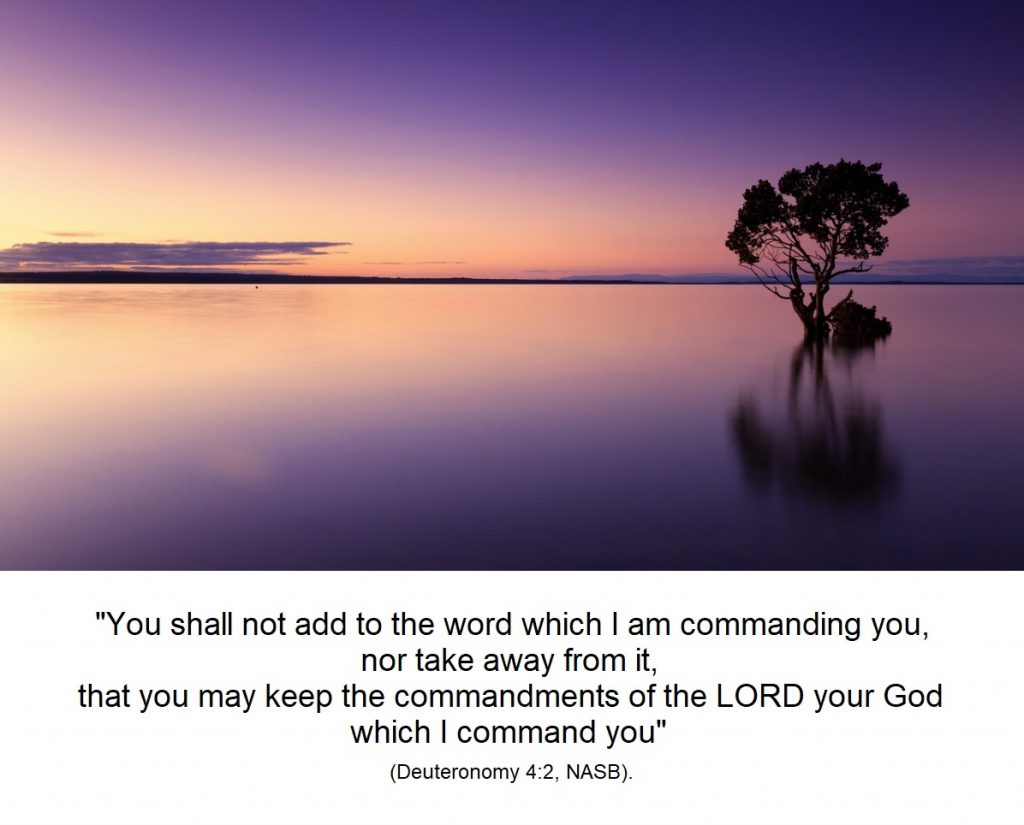“Go therefore and make disciples of all the nations…teaching them to observe all that I commanded you; and lo, I am with you always, even to the end of the age” (Matthew 28:19-20, NASB).
——————–
Contents:
1) A Tale of Two Prophets (Andrew Dow)
2) God Does Not Forget His Own (Greg Gwin)
——————–

-1-
A Tale of Two Prophets
Andrew Dow
It was the worst of times! Rehoboam became king over Israel following the glorious reign of his father, Solomon. After King Rehoboam refused the advice of his wise counselors, “none but the tribe of Judah followed the house of David” (1 Kings 12:20, NASB). While Rehoboam unsuccessfully attempted to force the northern tribes into submission (1 Kings 12:21-24), Jeroboam became king over those northern tribes and constructed idols for his people to worship (1 Kings 12:25-33). This sharp division plagued the Kingdom that once thrived under the rule of David and Solomon. Thus a downward spiral began that would ultimately end in captivity.
As we turn to the thirteenth chapter of First Kings, we find “a man of God” traveling from Judah (the Southern Kingdom) to Bethel (the Northern Kingdom) in order to confront Jeroboam concerning his newly constructed idols (1 Kings 13:1-3). During this encounter, God displayed His power by withering and restoring Jeroboam’s hand (1 Kings 13:4-6). The King was so impressed by this display that he asked the man of God to come into his home (1 Kings 13:7). The Prophet responded, “If you were to give me half your house I would not go with you, nor would I eat bread or drink water in this place. For so it was commanded me by the word of the Lord, saying, ‘You shall eat no bread, nor drink water, nor return by the way which you came’” (1 Kings 13:8-9). With these words, the man of God left the presence of King Jeroboam.
At this point, our story gets particularly interesting. The text introduces a new character to the story: “Now an old prophet was living in Bethel” (1 Kings 13:11a). This old prophet found out about the exchange between King Jeroboam and the man of God, and he quickly went out to find his young counterpart (1 Kings 13:11b-14a). The prophet found him and invited him into his home, but the man of God reiterated the instructions he had received from God (1 Kings 13:14b-17). The old prophet lied to the young man, “I also am a prophet like you, and an angel spoke to me by the word of the Lord, saying, ‘Bring him back with you to your house, that he may eat bread and drink water’” (1 Kings 13:18). Having heard the old prophet’s words, the young prophet abandoned God’s instructions, and followed the man home (1 Kings 13:19). At the home of this prophet, the Lord spoke again to the young man, but this time his message was one of condemnation (1 Kings 13:20-22). “Now when he had gone, a lion met him on the way and killed him, and his body was thrown on the road” (1 Kings 13:24).
Why Did All of This Happen?
Why did the events of this story take place, and, perhaps more significantly, why are they recorded in Scripture? The events recounted above may seem troubling to some. Why did God send the young prophet on this journey? Why did the old prophet tempt the young prophet to disobey the Lord by lying to him? The young prophet was obviously misinformed, why did God see fit to punish him so severely? Why is the old prophet not punished like the young prophet? These kinds of questions are worthwhile questions to consider. I will not pretend to possess all the answer to these questions, but let me suggest two things along these lines.
First, perhaps these events transpired to show the absolute authority and seriousness of God’s word. God had sent this prophet to condemn the idolatrous worship that Jeroboam was setting up in the Northern Kingdom. He had given him very precise instructions (cf. 1 Kings 13:9, 17), just like He had offered Israel precise instructions on how to worship (see Exodus-Deuteronomy). As Jeroboam and the Northern Kingdom were deviating from God’s instructions, God demonstrated through this unfortunate situation that He expects His people to follow His commands. After the young prophet’s death we read, “And behold, men passed by and saw the body thrown on the road” (1 Kings 13:25). It is almost as if this young prophet’s body is left as a monument for all to see the authority and the seriousness of God’s instructions. Later we find the words of the old prophet, “the things shall surely come to pass which he cried by the word of the Lord against the altar in Bethel and against all the houses of the high places which are in the cities of Samaria” (1 Kings 13:32). Even the old prophet recognized that God’s word is authoritative and would be accomplished! The chapter ends by pointing out that “Jeroboam did not return from his evil way” (1 Kings 13:33-34). If God punished the young prophet for a seemingly trivial disobedience, how much more would Jeroboam and Israel be punished for abandoning the Law of God?
Second, perhaps these events came about to demonstrate that God’s Word was the final standard, even above the wisdom of old age. This event provides an interesting contrast to Rehoboam’s downfall in chapter twelve. After consulting both young men and old men, “the king… forsook the advice of the elders which they had given him” (1 Kings 12:13). In this instance, it was wrong for Rehoboam to refuse the wisdom of the aged men. The very next chapter introduces us to “an old prophet” (1 Kings 13:11). Of course, as we pointed out, this old prophet led the young man of God to act contrary to God’s instructions. In this instance, then, it was wrong for the young prophet to accept the foolishness of the aged prophet. Perhaps this is the point: listen to God above EVERYONE else. Sometimes (if not most times) it is advantageous to hear and obey the wisdom that accompanies old age, but there is absolutely no substitute for hearing and obeying the final standard, God’s Word.
What Do We Learn?
The two lessons mentioned above are valuable and important lessons we can learn from this biblical story. First, we need to always remember that God means business. Even if He doesn’t strike us down the instant we sin, God will punish us for our disobedience throughout eternity! Second, we need to always remember that God’s Word is the final word. Regardless of what man has to say, we must understand that God’s Word will judge us.
Christians are in much the same position as this young prophet. We have been given a message from the Lord that is complete in every respect (cf. 2 Tim. 3:16-17; Jude 3). Our obligation is to follow that message despite all the noise going on around us (cf. Gal. 1:8-9). It is easy for us to come across an idea that an elder, preacher, teacher, or scholar promotes and accept it as God’s Word. We must not be like the young prophet, but instead we must “examine everything carefully” (1 Thess. 5:21). Some hear new ideas from televangelists, self-help books, or favorite religious publications and quickly abandon what God has revealed to them through His written Word. Brethren, let’s make it our habit to examine “the Scriptures daily” (Acts 17:11) and make it our aim to “obey God rather than men” (cf. Acts 5:29)!
— Via Faithful Sayings, June 14, 2015
——————–

-2-
God Does Not Forget His Own
Greg Gwin
Facing difficult and uncertain times, God’s people felt that He had possibly abandoned them . . . “But Zion said, ‘The Lord has forsaken me, and the Lord has forgotten me’” (Isaiah 49:14).
But God offered them the positive assurance that they so desperately needed . . . “Can a woman forget her nursing child, and have no compassion on the son of her womb? Even these may forget, but I will not forget you. Behold, I have inscribed you on the palms of My hands . . .” (vs. 15-16).
He assured them that it would be more likely for a woman to forget her own child than for Him to forget His people. Just as we sometimes write important reminders on the palm of our hand, even so the Father had them written on His hand. Although their circumstances seemed bleak, God had not forgotten them.
In our own lives we sometimes face a combination of trials and troubles that can raise doubt and uncertainty. At such times we must also remember God’s promises . . . “He Himself has said, ‘I will never desert you, nor will I ever forsake you,’ so that we confidently say, ‘The Lord is my helper, I will not be afraid. What shall man do to me?’” (Hebrews 13:5-6).
We have “great and precious promises” from the Creator of the entire universe (2 Peter 1:4). He loves us and cares for us, and He desires all good things for us (Jeremiah 29:11). It should surely comfort us to know that our Heavenly Father has our names written on His hand. “What then shall we say to these things? If God is for us, who is against us?” (Romans 8:31).
— Via The Beacon, November 28, 2021
——————–
The Steps That Lead to Eternal Salvation
1) Hear the gospel — for that is how faith comes (Rom. 10:17; John 20:30-31).
2) Believe in the deity of Jesus Christ, the Son of God (John 8:24; John 3:18).
3) Repent of sins. For every accountable person has sinned (Romans 3:23; Romans 3:10), which causes one to be spiritually dead (Ephesians 2:1) and separated from God (Isaiah 59:1-2; Romans 6:23). Therefore, repentance of sin is necessary (Luke 13:5; Acts 17:30). For whether the sin seems great or small, there will still be the same penalty for either (Matt. 12:36-37; 2 Cor. 5:10) — and even for a lie (Rev. 21:8).
4) Confess faith in Christ (Rom. 10:9-10; Acts 8:36-38).
5) Be baptized in water for the remission of sins (Mark 16:16; Acts 2:38; 22:16; 1 Pet. 3:21). This is the final step that puts one into Christ (Gal. 3:26-27). For from that baptism, one is then raised as a new creature (2 Cor. 5:17), having all sins forgiven and beginning a new life as a Christian (Rom. 6:3-4). For the one being baptized does so “through faith in the working of God” (Col. 2:12). In other words, believing that God will keep His word and forgive after one submits to these necessary steps. And now as a Christian, we then need to…
6) Continue in the faith by living for the Lord; for, if not, salvation can be lost (Matt. 24:13; Heb. 10:36-39; Rev. 2:10; 2 Pet. 2:20-22).
——————–
Tebeau Street
CHURCH OF CHRIST
1402 Tebeau Street, Waycross, GA 31501
Sunday: 9 a.m. Bible Classes and 10 a.m. Worship Service. We also have a Song Service at 5 p.m. for every first Sunday of the month.
Wednesday: 7 p.m. for Bible Classes
evangelist/editor: Tom Edwards (912) 281-9917
Tom@ThomasTEdwards.com
https://thomastedwards.com/go/all.htm (This is a link to the older version of the Gospel Observer website, but with bulletins going back to March 4, 1990.)